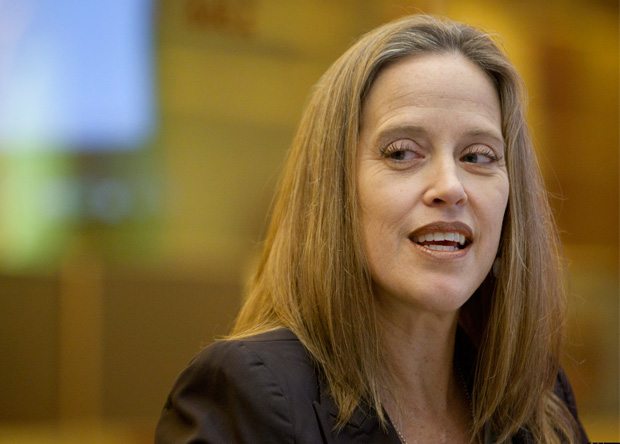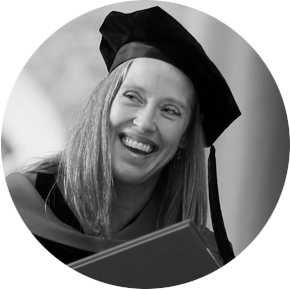Wendy Kopp is the CEO and Co-Founder of Teach For All, a global network of independent nonprofit organizations working to expand educational opportunity in their own countries and the Founder of Teach For America (TFA), a national teaching corps. In 1989, Kopp proposed the creation of Teach For America in her undergraduate thesis at Princeton University.
In 2007, Kopp founded Teach For All, a global network of independent nonprofit organizations that apply the same model as Teach For America in other countries. Wendy has been recognized as one of Time Magazine’s 100 Most Influential People and is the recipient of numerous honorary degrees and awards for public service.
Wendy Kopp recently visited Armenia and attended signing of a memorandum between Teach for Armenia and Armenian Education and Science Ministry. In early July 2016 Teach For Armenia together with Scholae Mundi Armenia and Initiatives for Development of Armenia Foundation (IDeA) held Teach For Armenia’s 2016 Fellowship Fellow Inauguration Ceremony at the campus of UWC Dilijan College.
- I think you had a chance to compare what Teach For Armenia is doing with your initiatives in other countries. If we make a comparison, what is the main difference in Armenia?
- There is nothing that has to be the same. All organizations in the Teach For All network are all united by a common mission and a common purpose, which is essentially to develop collective leadership, to ensure that all kids fulfill their potential. All of these organizations do that through living in the certain kind of unifying principles. They’re all recruiting and selecting as many as possible of their country’s top recent college graduates, asking them to commit two years to teaching their highest-need communities, investing in their training and support, so that they have a positive impact for kids and ultimately gain a foundational experience for a lifetime of leadership and advocacy, and pursuit of a dream - educational opportunity for all.
Every local organization, including Teach For Armenia, is thinking about, “How do we adapt this approach into this context in the way that is going to have the greatest impact?”.
What I have been so impressed with, first of all, just to see such a diverse group of people signing up for this, - some folks from the communities in which Teach For Armenia is working, others who are maybe from much more privileged backgrounds.
To see them putting at the centre of the work a vision for what they want to be true for their students, that speaks to the students, gaining essentially a holistic education and gaining not only the academic skills, but also the character skills and the confidence that is necessary to thrive in the future economy and to shape a stronger Armenia. And also just to see the strength of support that they have from the public and private sectors.
- I want to ask you about the role of the teacher. On one hand, there are many online educational tools, it’s easy for people to find “everything” on the web, but at the same time, we are starting to understand that the role of the teacher is becoming more and more important. What should be done to motivate people to become mentors and share their experience, knowledge, leadership with kids?
- All across the Teach For All network we think about teaching as leadership. The most successful teachers are getting their kids on a mission to achieve their full potential and to gain a really good education. I fully agree that good teaching is far more than communicating the subject area effectively. Across the Teach For All network we believe that helping the rising generation understand what teaching successfully really is about is the best way to enlist many more people in deciding to make this a career.
That being said, the belief that’s at the core of our work is that the only path to the kind of transformational change we need for the highest-need kids is ultimately a systemic change. We need many-many more tremendous teachers, but we need a lot of other things as well. We need to rethink the way schools are even designed, how school systems operate. We need to take pressure off of schools by improving the quality of healthcare, nutrition, and early education. It’s a very big state of things that needs to happen. We believe that the path to affecting the systemic changes that need to happen is through cultivating a group of leaders in any given community or country, who understand what you understand, what you’ve taught successfully in a high-need community.
The people who’ve done that have a very grounded understanding of both the problem and the solution. What we’ve seen is that those people can work together from every level of the school system and outside it to affect the fundamental changes that we need to see.
- You’ve seen these 32 teachers that will go to schools in the remote areas of Armenia for two years. Do you have any statistics on how many of them are willing to continue or are involved in some other way after those 2 years?
- All across the Teach For All network we’ve seen that teaching successfully for two years is completely transformational for the teachers themselves. Two thirds of the alumni of these organizations all across the network are still working full-time in education, and many more are working from other sectors like healthcare, policy or law, but are doing things that impact schools or the quality of life in low-income communities.
 Wendy Kopp
Wendy KoppPhoto: Getty Images
What we’ve already started to see everywhere from Bulgaria to Peru and India, in so many places all across the network we’ve seen these very young leaders, who have this common experience, already assuming such significant leadership roles - running schools, starting initiatives to contribute to changing the way other teachers are brought into the profession, already assuming positions of influence in their government, ministries, and such.
- You have visited UWC Dilijan College, and its founders are always saying that their vision that this college should become the driver for the whole region and to help change the life of people, their social conditions, etc., and not to become like an “oasis” in this region. Do you really think that this college can really become something bigger than just being an educational institution?
- I’ve been so inspired to see how comprehensive Ruben [Vardanyan] and Veronika’s [Zonabend] work is around developing Dilijan and putting UWC at the centre of the effort, but with their other projects to develop. It’s so impressive and exciting. I’m looking forward to the day when we have the global Teach For All conference in Dilijan. I’m sure it will happen. I think it’s such a powerful vision that they have, we are very excited to be a part of it.
- Armenians have a very rich cultural heritage and at the same time, we are a post-Soviet nation that is still in transition. Some people say that we are looking very much back to the past and we have to look more into the future. Do you think that from the educational point of view it’s possible to find a right balance between past and future?
- That’s such a beautiful question, and we think a lot about this at Teach For All. We think that kids need to gain a deep understanding and appreciation for their own culture and history. At the same time, they need to gain the skills and the knowledge to be able to change the future. We think both are equally important, and I hope that the Teach For Armenia teachers will be a force for that. Part of helping students develop a sense of agency and a sense that they can shape their own careers, change Armenia and the world is helping them gain a foundation of understanding their own culture and history, and gaining a real appreciation of that.
Ara Tadevosyan talked to Wendy Kopp





















